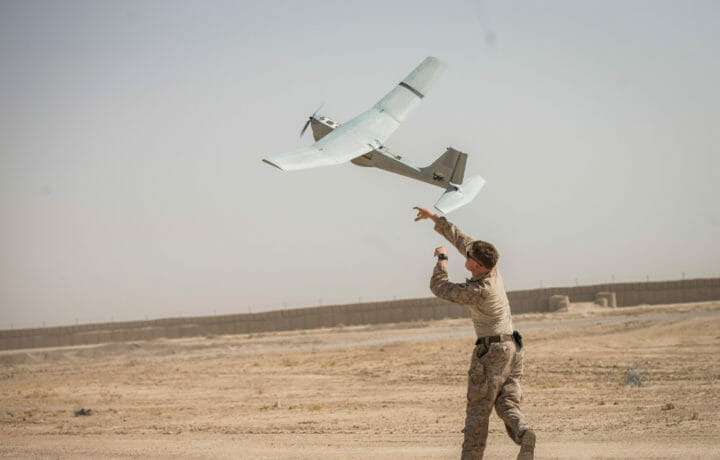The demand for several of AeroVironment’s (AVAV) products is likely to grow rapidly over the longer term, and the drone maker’s recent acquisition could significantly boost its top and bottom lines going forward. Moreover, the stock jumped 36% in the three months that ended on June 4, and it rose 9% in the month that ended on the latter date, suggesting that it has some momentum.
However, AVAV stock could sink a great deal if the Ukraine War comes to an end, while the shares’ valuation is certainly not low. Therefore, I recommend that growth investors keep an eye on the shares for now.
Potent Drones
As I pointed out in a previous article, AeroVironment’s “Switchblade 300 (drone) can travel as much as 18 miles and stay over its target for up to 20 minutes, while the 600 can fly 24 miles and hover over targets for as much as 40 minutes.” Used to “attack enemy forces,” these products have been utilized a great deal by Ukraine during its war with Russia. In fact, 38% of AVAV’s revenue came from Ukraine during the company’s fiscal year that ended in April 2024, according to Barron’s.
Further validating AeroVironment’s drones, the company in August received a five-year contract worth up to $990 million in exchange for providing an “indefinite” number of the systems to the U.S. Army. As I mentioned in the previous article, in light of America’s purchase of a large number of the firm’s drones, many U.S. allies are likely to also look to buy them.
Since my previous article on AVAV was published, the company announced that it had won a deal to provide “more than 40 uncrewed ground vehicles” to Germany and disclosed that it would obtain as much as $181 million from Denmark to supply its JUMP 20 UAS drone to the latter country. The Jump 20 can fly for 13+ hours or 115 miles and “features a common autopilot and ground control system architecture.”
Also importantly, CEO Wahid Nawabi reported on the company’s fiscal third quarter earnings call, held in March, that “10 countries (have) placed firm orders (for the Switchblade drones) and more than 20 more (are) in active engagements” regarding those drones.
And providing more evidence that its core drone business is performing very well, the firm expects to receive an impressive total of $1 billion of orders during its current fiscal year, and its backlog as of the end of its Q3 came in at a record $764 million.
Meanwhile, the company has made ” advancements in autonomous flight technology and AI integration, enabling more precise and reliable drone operations in complex environments,” Securities.io reported. Supporting that statement, the firm’s new P550 drone utilizes “proven advanced AI and autonomy, while providing “advanced situational awareness and enhanced force protection,” the company reported. Further, AVAV recently launched an autonomous kamikaze drone. Called the Red Dragon, it reportedly “can autonomously perform tasks even without a GPS signal at a distance of 400 km.”
In light of Defense Secretary Pete Hegseth’s prioritization of drones and AI, AVAV should perform very well over the longer term.
Other Well-Positioned Products and a Promising Acquisition
AeroVironment is also well-positioned to benefit significantly from the Trump administration’s major anti-missile initiative, Golden Dome. That’s because the company offers products with “remote sensing, tracking, and classified space” capabilities.
Moreover, the company’s acquisition of BlueHalo , which closed in May, adds “space technologies, counter-UAS, … and cyber solutions” to AeroViroment’s portfolio, according to AVAV.
Since all three of those areas have been cited as top priorities by Hegseth, BlueHalo’s businesses, with the help of AeroVironment’s marketing prowess and connections with the Pentagon, should be able to greatly increase its revenue from the agency going forward. Similarly, AVAV can use its connections with foreign countries to successfully market BlueHalo’s products to them.
Ukraine Risks and a High Valuation Should Keep Investors on the Sidelines
With the Trump administration pressing for the Ukraine War to end, AeroVironment’s revenue could suddenly drop sharply, causing its shares to sink meaningfully.
In AVAV’s fiscal year that ended in 2024, about 38% of the company’s revenue came from Ukraine, as I noted previously. According to Nawabi , the company’s CEO, that proportion is expected to drop to 17% during the current fiscal year and to 6% during the current quarter. Still, if the conflict ends, analysts’ current average projections could easily suddenly sink 5%, causing the company’s shares to retreat sharply.
Making the latter scenario more likely is the shares’ relatively high valuation. Specifically, they are changing hands at a rather steep forward price-earnings ratio of 56.8 times.
Given this situation, investors should wait for a decline in the shares’ value before buying them.
*This article is intended to be informational only; it is not financial advice.




